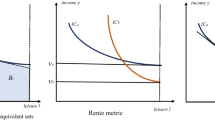Abstract.
Welfare economics is incomplete as it analyzes preference without going on to analyze welfare (or happiness) which is the ultimate objective. Preference and welfare may differ due to imperfect knowledge, imperfect rationality, and/or a concern for the welfare of others (non-affective altruism). Imperfection in knowledge and rationality has a biological basis and the resulting accumulation instinct amplifies with advertising-fostered consumerism to result in a systematic materialistic bias, as supported by recent evidence on happiness and quality of life. Such a bias, in combination with relative-income effects, environmental disruption effects, and over-estimation of the excess burden of taxation, results in the over-spending on private consumption and under-provision of public goods, and may make economic growth welfare-reducing. A cost-benefit analysis aiming even just at preference maximization should offset the excess burden of financing for public projects by the indirect effect through the relative-income effect and by the environmental disruption effect. A cost-benefit analysis aiming at welfare maximization should, in addition, adjust the marginal consumption benefits of public projects upward by a proportion determined by the proportionate excess of marginal utility over marginal welfare of consumption. The environmental disruption effects have also to be similarly adjusted upward. However, the productive contributions of public projects should not be so adjusted.
Welfare economics has achieved much, though still with long-standing weaknesses (e.g., the inability to make non-Pareto comparisons due to the unwillingness or difficulties in making interpersonal comparisons of cardinal utilities). It is not the intention of this paper either to survey the achievements or to remedy the weaknesses. Rather, it is argued that welfare economics is too narrow in focus and should be expanded in a number of aspects to make the analysis more complete and hence more useful. Some of the aspects discussed below have long been known but largely ignored in welfare economic analysis. Some are less well known and controversial points which are nevertheless important for welfare.
Similar content being viewed by others
Author information
Authors and Affiliations
Additional information
Received: 22 January 2001/Accepted: 3 April 2002
This paper is revised from the keynote paper of the same title at the Conference on `Economics and the Pursuit of Happiness', Nuffield College, Oxford 2000, and combined with the paper `Towards a welfarist cost-benefit analysis' presented at American Economic Association Meeting, New Orleans, 2001. The paper was revised during my visit to the Division of Applied Economics, Nanyang University, Singapore. I am also grateful to Maurice Salles and two anonymous referees of this journal for helpful comments.
Rights and permissions
About this article
Cite this article
Ng, YK. From preference to happiness: Towards a more complete welfare economics. Soc Choice Welfare 20, 307–350 (2003). https://doi.org/10.1007/s003550200184
Issue Date:
DOI: https://doi.org/10.1007/s003550200184




